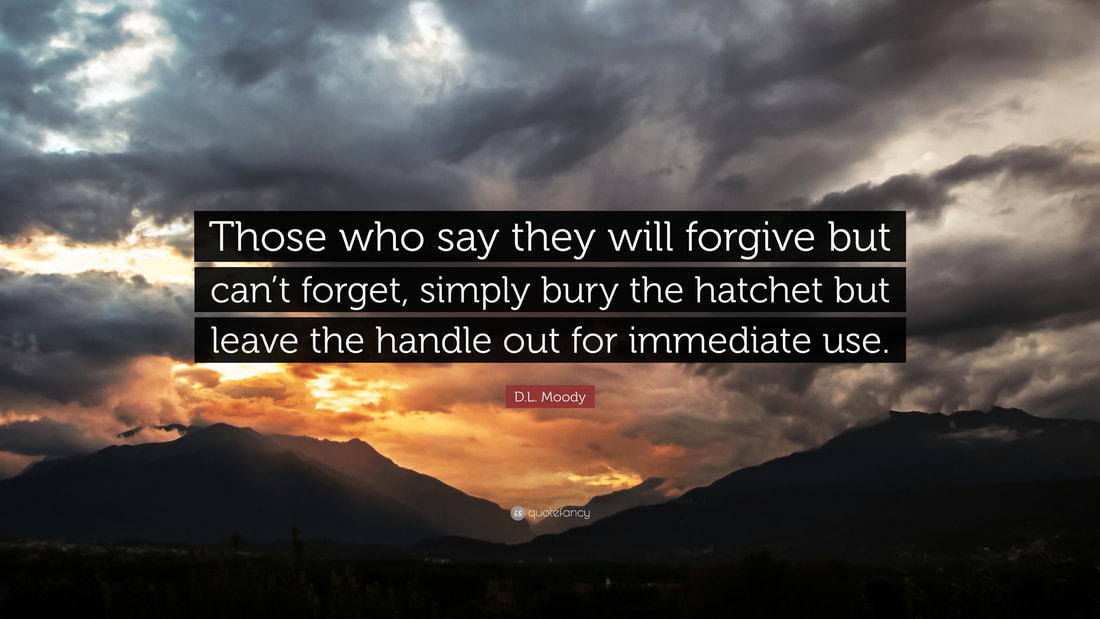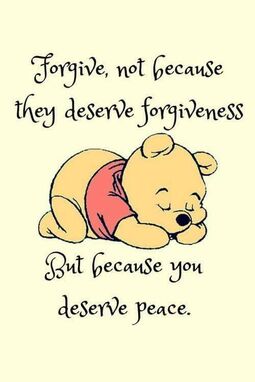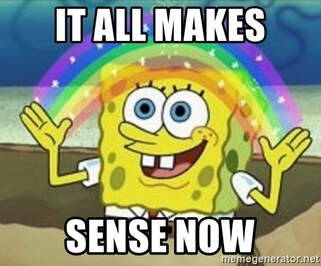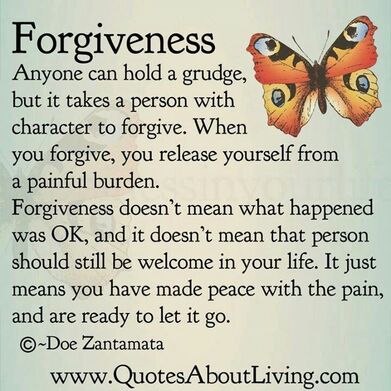|
Bury the Hatchet? What does THAT mean? The phrase “bury the hatchet” means to end a quarrel or conflict; to settle your differences, and to make peace. “Burying the hatchet” originated as an American Indian tradition. The Battle Axe was the Native American emblem of warfare, and as a symbol of warfare, it represents two sides of the coin: war and peace. When Native American tribes were at war with one another and if one of the chiefs chose to “bury the hatchet”, then the war would end and peace between the tribes would begin. However, if the hatchet was later uncovered and dug out of the ground, the deadliest warfare between the tribes was declared. The concept of burying the hatchet is a helpful image of forgiveness. The Indian chief buries what he could use against his rival, and the officer buries his own instrument of death which could be used against the tribe. The three simple words “I forgive you” do not provide the power of forgiveness that leads to inner peace. The peace comes with the actual burial of the offence.  Doesn’t forgiveness imply WEAKNESS? Many people struggle with forgiving others because they buy into some common myths about forgiveness: 1. Forgiving means that what happened was OK: There is a perception that if we forgive someone, it either lets the person off the hook, or is somehow an indication that what happened was OK. However, these are two separate processes: a) an understanding that the act was not OK and that the person remains accountable, and b) a process of forgiveness that happens in parallel. 2. If I forgive, it might happen to me again: For people who have experienced something traumatic, one of the adjustments afterward is often a vigilant stance of self-protection to avoid being a victim again. For some people with these experiences, the anger, pain, and anxiety related to the event, operate as fuel to help remain on guard. Through counseling, many people can develop new ways to protect themselves physically and emotionally, which allows for a forgiveness process to begin without the fear of being harmed again. 3. If I forgive, it means I have to reconcile with the person: When we are harmed in a relationship and have taken steps to distance ourselves, forgiving the person does not mean we have to go back. If we ultimately want to return to the relationship, forgiveness can help it be successful, but if you are done with it, you can forgive and still choose it to be over. 4. If I don't forgive, then I am a bad person: Some people feel a pressure to forgive even the most terrible acts due to pressure from others and a belief that being unforgiving makes you a "bad person." Extending forgiveness does not set the bar for a “good person”. Instead forgiveness is simply an option we have when we are looking for peace and healing. 5. I only need to forgive once. While this may be true for a handful of people, most people, especially ones who have suffered trauma, will find that they have to make the choice to forgive their offender multiple times. Some people will even do this on a daily basis until the pain of the emotional wound has been processed and healed. 6. I need to forgive for the sake of the other person. The act of forgiveness is actually quite the opposite of this myth. We forgive in order to move forward with our own lives. Forgiveness brings peace to our souls allowing us to let go of bitterness and resentments that breed negativity within us. WHY forgive people? 1. Forgiveness is life-changing. Grudges seep into your thoughts and dominates your emotions. The grudge sits in you like a big, heavy lump of steel that refuses to move. But start to get serious about forgiveness and make peace your priority, and your life will change. You’ll be more free, more open, and more available to enjoy yourself. 2. Forgiveness is about you, not about anyone else. Forgiveness is a process that opens your heart and gives you peace of mind. If you are stuck in hate and bitterness, you are the one suffering. The letting go that constitutes forgiveness untangles the knot in you so you feel happier, lighter, and more present. You’re no longer living in distressing stories and painful emotions. 3. Forgiving doesn’t mean you approve of bad behavior. There’s no doubt about it: people do nasty things, and what happens in life is not always fair. But what does not forgiving do? It doesn’t get you resolution, and it doesn’t change what happened. Forgiving doesn’t mean you let that other person off the hook. It means you’re letting yourself off the hook. If people have wronged you, they need to walk their own path about what they did. Your path is your business. You can’t control what happened or other people’s behavior, but you can control how you meet your own experience. If you persist in focusing on the terrible things someone did to you, even though the actual behavior stopped long ago, you are still hurting yourself in your mind. If you commit to letting it go and focusing on the joys and gifts present right now, you are well on your way to healing your heart. 4. If you’re having trouble forgiving, you still hold the belief that what happened shouldn’t have happened. This is resistance and will paralyze you. If you fight the facts, you’ll never win because it’s too late. What happened already happened. Instead, take a deep breath, and accept the facts. Realize how painful it’s been for you. Let the sadness, grief, and anger come. And when you’re ready, step away from the pain refreshed and ready to live again. 5. You’re hurting yourself more than anyone else. You’re holding a grudge when you feel locked into a story of what happened and you feed that story with your attention. Grudges are all about “ill will and resentment.” When you resist forgiving, you’re solidifying your experience of ill will and resentment. 6. You don’t need an apology. If you can have a heartfelt conversation with whomever you feel wronged you, then go for it. But often that isn’t in the cards. The person may be unable to hear you, unavailable, or deceased. And you are likely to find that the apology isn’t that satisfying anyway. Forgiveness is an inner letting go. In the state of not forgiving, you’re plying the hurtful story with your attention, so it stays feeling very real for you. When you forgive, you stop thinking about the story, and you welcome your feelings in your own space of awareness. And this is what you can do in your own quiet moments. 7. Forgiving supports the health of your body. Research has shown that forgiveness reduces stress, decreases blood pressure, cholesterol, and heart rate, and improves sleep and immune system functioning. It also reduces anxiety, depression, and anger, and promotes a sense of well being. The flip side is that not forgiving does a number on your body due to chronic anger and stress. 8. You’ll probably need to express your feelings. When we’re caught up in our anger and resentment, we’re actually avoiding the intensity of our feelings. Let yourself feel whatever you feel—anger, rage, sadness. Express these feelings with a therapist, trusted friend, in a letter you don’t send, or in front of an empty chair. Then take a breath and breathe with the sensations you feel. Let these sensations rise up and pass on. You’re being present with your experience in a deeply loving way. 9. It’s empowering to forgive. Not forgiving keeps you squarely locked into the victim mentality. You feel that something was done to you, and you put the possibility of healing into someone else’s hands. When you make the decision to embark on the path of forgiveness, you’re reclaiming your power. You’re taking responsibility for your own thoughts and feelings and helping your own sense of peace to flourish. OK, OK…but HOW do I forgive?
Forgiveness is a process, not an event, and it is generally motivated by some recognition that what we’re holding on to is causing us damage and holding on to it just isn’t worth it anymore.” When we choose to not forgive ourselves, we are holding on the pain from the past. Even just entertaining the idea of forgiveness may be beneficial. Because forgiveness IS a process, there may be no magic moment when all is forgiven; we may always carry some residual feelings of hurt or resentment toward ourselves or another. Much like the grief process, forgiveness seems to occur in stages. These stages are not a one size fits all, but rather a suggestion of a process. They may be experienced in a different order, skipped around, or some steps even skipped entirely. The goal is not to GET RID OF the feelings like anger or sadness, but to “experience them and integrate them into the self-esteem with greater understanding and insight and through doing so moderate them and reframe the issue.” Reframing begins with the realization that you are hurting only yourself when nursing resentments. People seem to go through about five predictable stages as they confront the issues that block their letting go and moving on. These stages can be repeated, alternated or leapfrogged. They are:
Written by Billie Baker-LCDC, LPC
0 Comments
Leave a Reply. |
Billie Baker-LCDC, LPCArchivesCategories |




 RSS Feed
RSS Feed